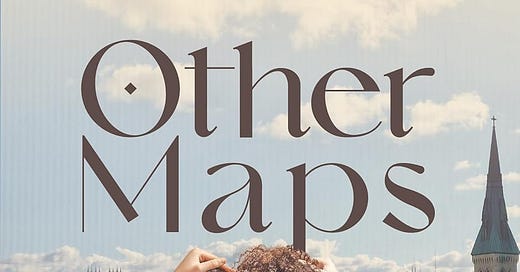At the start of Rebecca Morris’ debut novel Other Maps, protagonist Anna Leverett is 26 years old and has reluctantly returned to her hometown of Guelph, Ontario to attend her father’s retirement party at a posh country club. After an embarrassing incident at the party, Anna contemplates leaving town earlier than planned. But at her mother’s request, she works on cleaning out her childhood bedroom instead. It’s here that she runs across a note from long-time friend Helen Wright.
It's a note that was delivered to Anna’s mother—who never passed it on to Anna.
Anna decides to look up Helen at her job at the Bay. Helen, who was born with a port wine stain birthmark on her face, works at the makeup counter where she offers cosmetics advice, including ways people can cover up features that embarrass them.
Helen never understood why Anna became suddenly distant in high school. All she knew was when they returned to school after the Christmas break back when Anna was sixteen and Helen fifteen, everything was different. Anna seemed withdrawn, rumours were swirling around, and Helen felt shut out by Anna’s refusal to talk to her.
When Helen and Anna chat at the food court, Helen starts to suspect that the turning point for Anna is a New Year’s party held by their schoolmate Oliver Sutton. Helen and Anna had attended the event together, and as Helen remembers it “at first, it was an adventure, hanging out with the cool kids, pulling each other from room to crowded room. Then Annie disappeared.”
Helen knows some of the rumours spread by her schoolmates weren’t true—for example, some were saying that Anna went to the party in part because she had a crush on Oliver, but it was Helen who wanted to go to the party in the first place.
When Anna says she doesn’t remember much about the party—that she blacked out—Helen suggests they find out what really happened. Anna is reluctant at first but agrees. After that, Other Maps is part buddy story, as Anna and Helen renew their friendship, and part mystery, as the two try to find out what really went on.
Clearly, something had an impact on Anna. When we meet her in the book’s opening pages, she is trying to numb herself with booze and drugs and starts making out with a waiter at her father’s retirement event, only to be discovered by her mother. When Anna visits Helen at work, her voice is hoarse from smoking and she projects a tough exterior.
But while they are talking, Helen catches “a glimpse of the old Annie underneath: puzzled, thoughtful, considering.” Later that evening, Helen remembers the innocent Anna of childhood, “the girl who’d stayed up past midnight on sleepovers to whisper-sing along to The Little Mermaid on VHS.” Morris uses Helen’s perspective and her belief that the friend she once had is in there somewhere to give us hope that Anna will find her way to a more hopeful place.
“Morris does a good job of arousing the reader’s curiosity.”
Morris does a good job of arousing the reader’s curiosity. Will Anna be able to overcome her demons? Will she find out the truth, and if so, what will she do with that knowledge? Along the way, who will close ranks, and who will be forthcoming? Who will support her in her quest, and who will turn away? The answers aren’t always what we might expect, and that’s part of the book’s appeal.
Other Maps is set in Guelph, Ontario, though Morris notes in the “Acknowledgements” section that the novel “takes plenty of liberties” and adds that “the Guelph in this book is not on any maps.” Still, as someone who has spent a bit of time in Guelph and Southern Ontario towns like it, there’s a ring of familiarity, as though Morris has captured the essence. Other Maps covers one year, with flashbacks to earlier times. The book’s present-day storyline begins in March 2004 and ends in March 2005.
I’ll be honest—the first chapter had a lot more reference to casual sex, over-indulgence in alcohol, and drug use than I’m normally comfortable with. If it hadn’t been a book I was reviewing, I might have said this isn’t for me. But alcohol, drugs, and casual sex are coping mechanisms for Anna, ways to escape a life-altering evening she doesn’t even remember. However, the taunts, rumours, and adverse treatment from classmates after the fact were bad enough in themselves.
In the end, Other Maps is a book about seeking the truth. Anna’s experiences illustrate the lasting impact of painful events. The book also explores family dynamics. Other Maps is not always a comfortable read, which is perhaps part of the point. But there is a hopeful undertone and a conclusion that makes the journey worthwhile.
About the Author
Originally from Guelph, Rebecca Morris lives in Montreal. She earned an M.A. in French from Dalhousie, had three children in three years and taught high school before turning to writing full-time. Rebecca's short stories have won several awards, including the Malahat Review Open Season Award and the Humber Literary Review Emerging Writers Fiction contest. Other Maps is her first novel.
About the Reviewer
Lisa Timpf is a retired HR and communications professional who lives in Simcoe, Ontario. Her poetry, fiction, creative nonfiction, and book reviews have appeared in New Myths, Star*Line, The Future Fire, and other venues. Lisa’s speculative haibun collection, In Days to Come, is available from Hiraeth Publishing. You can find out more about Lisa’s writing and artwork at http://lisatimpf.blogspot.com/
Book Details
Publisher : Linda Leith Publishing (Sept. 14 2024)
Language : English
Paperback : 320 pages
ISBN-10 : 1773901621
ISBN-13 : 978-1773901626





